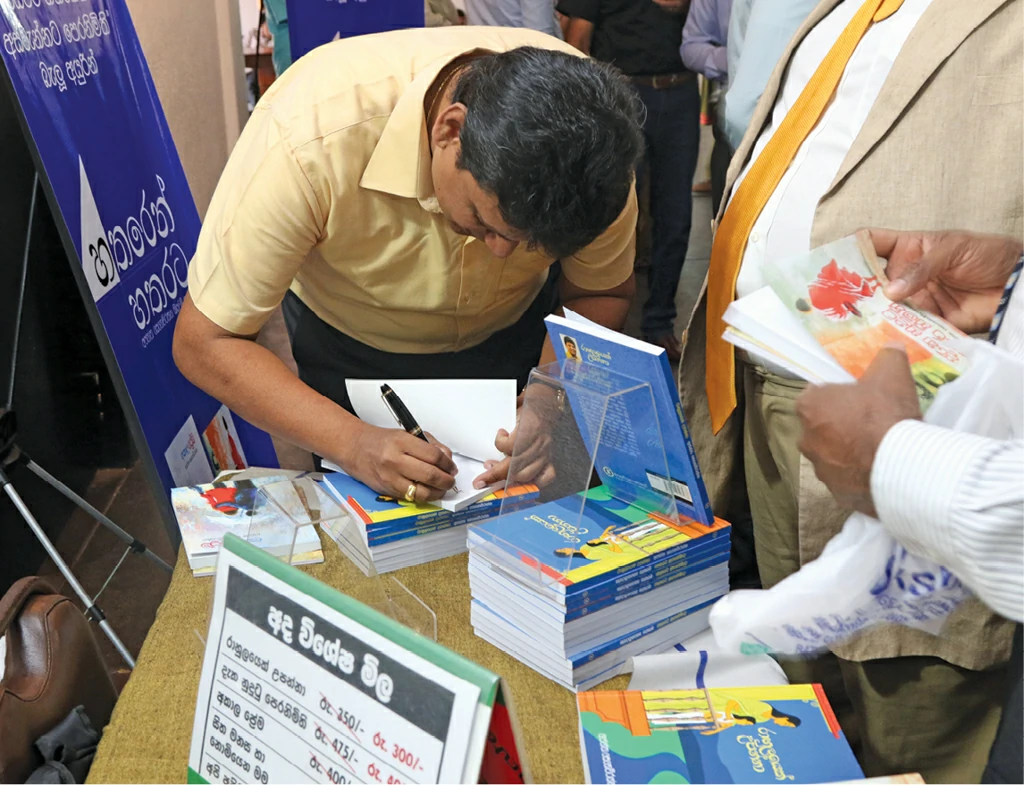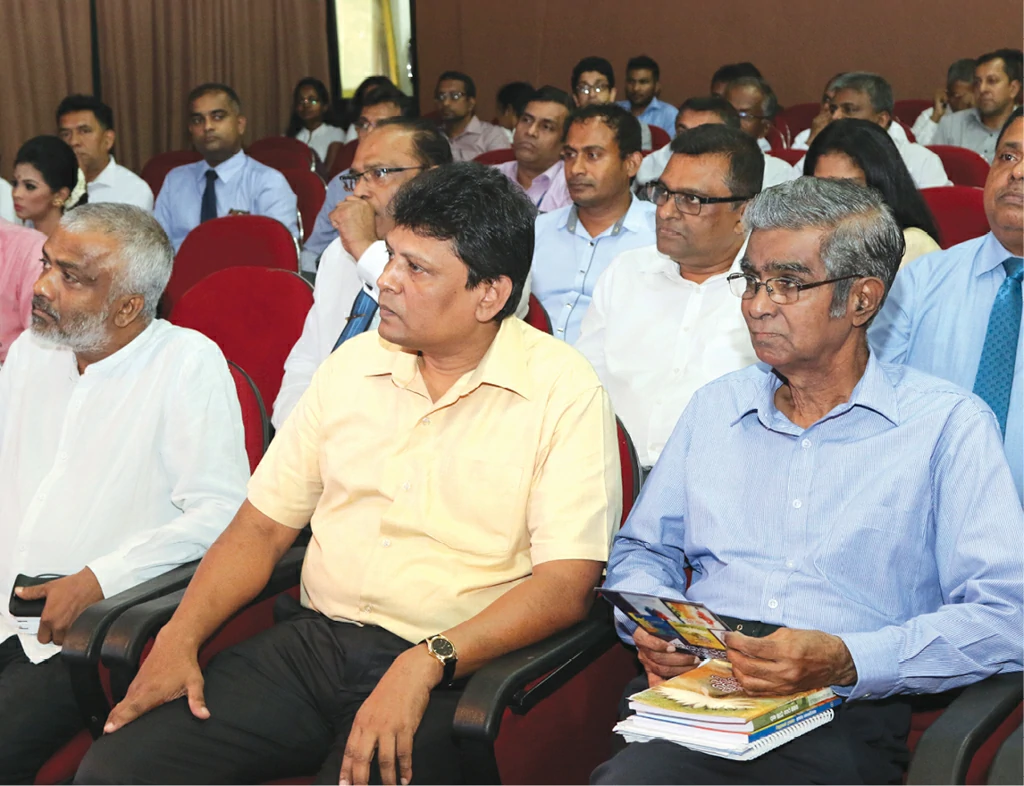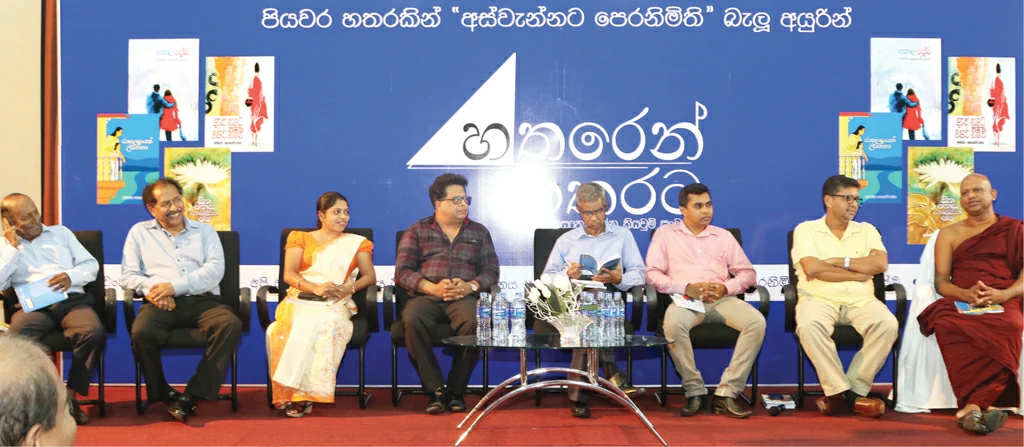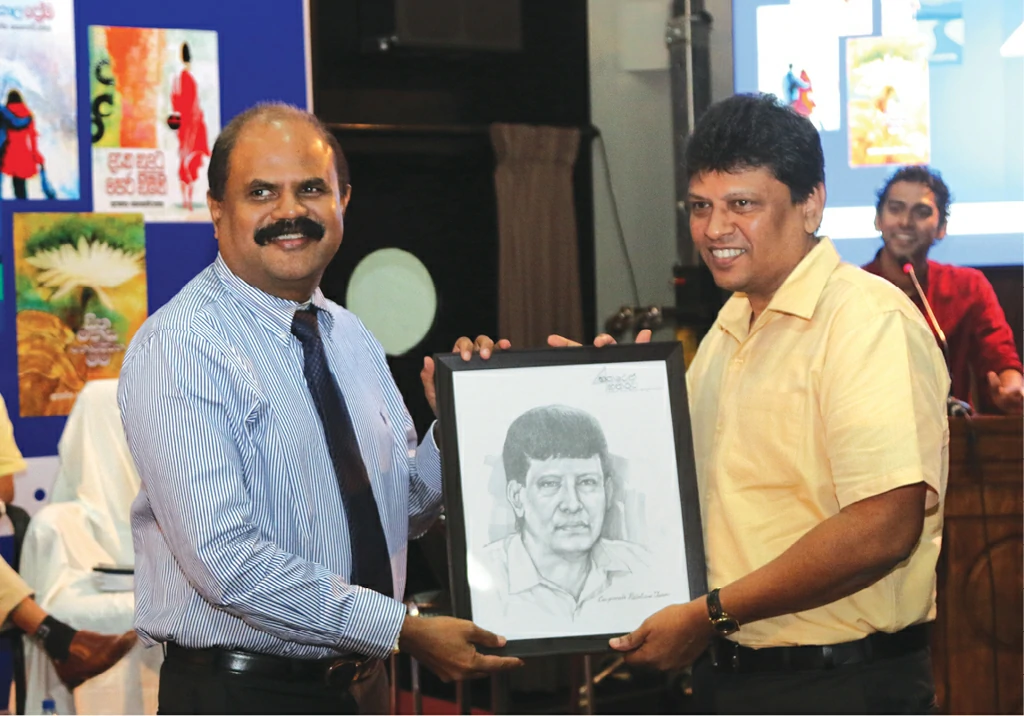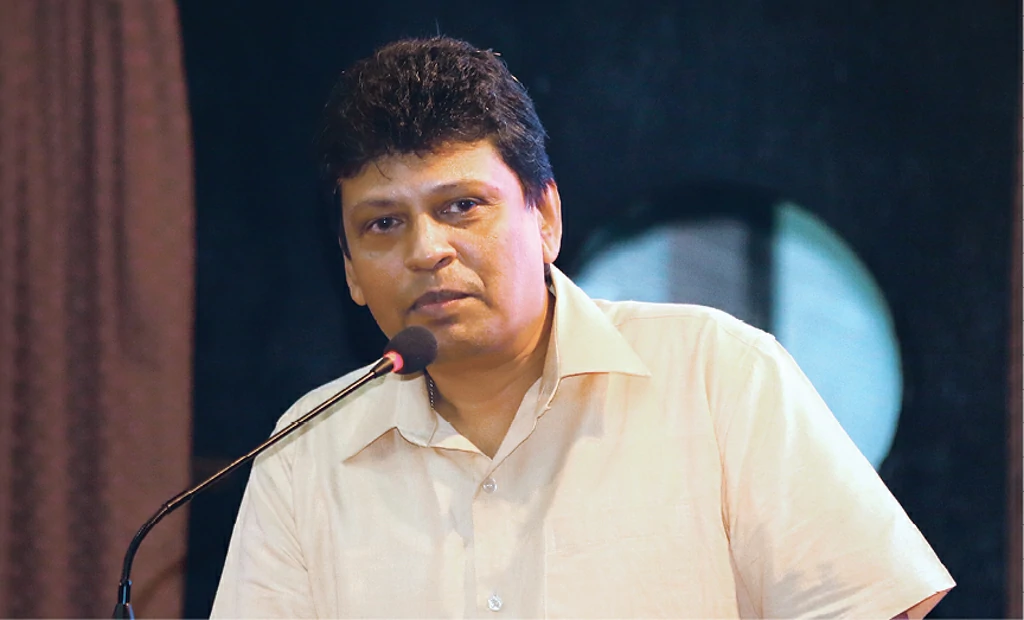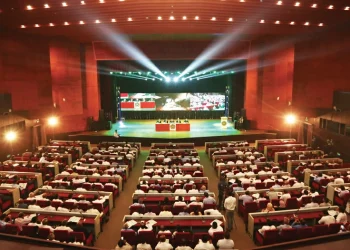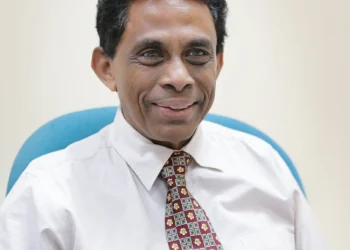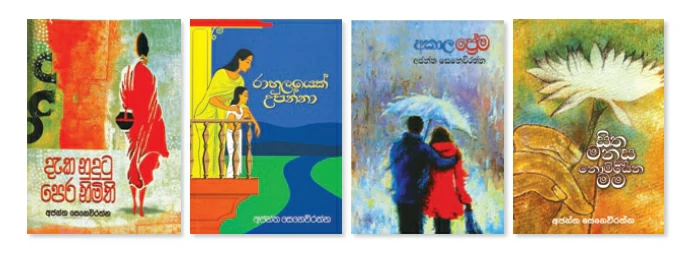
‘Hatharen Hathara’ was a forum organised to discuss the four books by author, Ajantha Seneviratne, who is also the Group Chief Marketing Officer, Sri Lanka Telecom. The books are titled ‘Daeka Nodutu Peranimithi’, ‘Rahulayek Upanna’, ‘Akaala Prema’ and ‘Sitha, Manasa Saha Nomiyena Mama’. An engineer by profession, the central theme of Seneviratne’s literary work demonstrate his profound understanding of Buddhist philosophy, interpolating historical facts to create stories of human characters.
The forte of Ajantha Seneviratne, the writer, as pointed out by critics is his ability to produce complex thoughts lucidly. This talent, Seneviratne explained is a result of his study of mathematics, a discipline that guided him to express complex ideas in the most succinct manner for the pleasure of the reader.
‘Aswennata Peranimithi’ in 2015 was the first discussion, which reviewed his first four books. ‘Hatharen Hathara’, at the Mahaweli Centre was a continuation of that forum. His four books were critiqued by Ven Dr Pathegama Gnanissara Thero, Professor, Buddhist and Pali Studies Department of the Bhiksu University of Sri Lanka; Dhamma Dissanayake, Academic; W A Abeysinghe, Author, Sunil Sarath Perera, Lyricist; Jayantha Chandrasiri, Film/Theatre Director; Sumudu Chathurani Jayewardene, Author/Poet, Gamini Kandepola, Editor, ‘Vimansa Sahithya Athireka’ and also Jayalath Manoratne, Dramatist.
“Ajantha Has A Sound Knowledge Of Buddhist Teachings. He Has Demonstrated His Ability To Study The Sutras With Discipline And Delivers It In Simple Language.”
Seneviratne’s latest work reveal a spiritual person, deep-rooted as well as engaged in the teachings of the Supreme Buddha. In providing a creative platform for the expression of the Dhamma, Seneviratne unveils his characters within the spectrum of earthly life with an exploratory account of the fundamentals held in the Sutras.
‘Sitha, Manasa saha Nomiyena Mama’, his fifth book is a deep analysis of spirituality. Continuing on the same theme ‘Daeka Nodutu Peranimithi’ explores the reality of being ordained into the monkhood. ‘Akaala Prema’ is about an office romance. His latest, ‘Rahulayek Upanna’ is a narration on the life of Rahula, the Buddha’s son, a debutante attempt by a Sri Lankan writer.
The critiquing of Seneviratne’s collection of books was led by the Ven Gnanessara Thero, who highlighted the predominance of religious writing that was prior to the advent of creative literature in Sri Lanka.
“Ajantha has a sound knowledge of the Buddhist teachings. He has demonstrated his ability to study the Sutras with discipline and delivers it in simple language. ‘Rahulayek Upanna’ in that sense reveals beyond what we have often confined ourselves to; we have focused on Rahula’s virtues and overlooked the young person he was”, said Ven Gnanissara Thero. He added that the writer has remained in the reality of his times, while ensuring that language is creative and soothing. Agreeing with the venerable thero, Sunil Sarath Perera pointed out that Buddhist philosophy has been transformed into understandable jargon, which does not cower-down to modern trends in writing.
Rahulayek Upanna according to Jayantha Chandrasiri delivers complex characters in the Buddha, Princess Yashodara, Prince Rahula and King Suddhodana as well as their complex relationships as the drama of renunciation unfolds. Seneviratne deals with the complexity of parting, an eternal separation that is told by the author without the emotional explosions of everyday human separation. Therefore, the characters and their relationships have been described with a complexity that demands a re-evaluation of those relationships beyond the mundane spectacle of historical writings. “Classical literature nourished by Buddhism” was Jayantha Chandrasiri’s conclusion.
The author’s clever use of language and depth makes the reader see deep into each character, emphasised Sumudu Chathurani Jayewardene. As a creative piece, the author demonstrates an effort in writing it. Rahula is revealed from birth; he is the central character whose feelings and actions are focused on. The author’s talent is evident in his ability to evoke character of particular personalities in his plot. “It is a story created from existing Buddhist literature”, noted Jayewardene who said that unlike most authors, Ajantha has an objective; to convey a message to society and luckily for him he maintains consistency to the end.
“The Core Of Ajantha’s Writings Is That He Cannot Escape From His Buddhist Moral Sense,” Said Dhamma Dissanayake.
“The core of Ajantha’s writings is that he cannot escape from his Buddhist moral sense,” said Dhamma Dissanayake who pointed out that ‘Daeka Nudutu Pera Nimithi’ rests within the scope of Buddhist tradition and concepts of the philosophy as well as Buddhist habit. It is inspirational and spontaneous in subject and use of language.
‘Daeka Nudutu Peranimithi’ according to Jayewardene is about the human tendency to err despite the knowledge of right and wrong. The underlying truth points to collapse and even with utmost effort, to stay the course. The central theme in Sitha, Manasa saha Nomiyena Mama, Jayewardene noted is the eternal course of selfish ‘me’ struggling to fit into the bigger picture of ‘we’.
The fact that Seneviratne acknowledges the study of mathematics in having allowing him to achieve a fluidity that is simple in narration is an important character in an author, stated Jayalath Manoratne. “Ajantha’s objectives are clear; a disciplined Buddhist who intends to attain Nirvana. And his schooling in the ‘Sutra’ is evident in his writing, Rahulayek Upanna is the ultimate corroborator of his practice of the theoretical concept.”
Jayewardene critiqued Akaala Premaya as a narrative with a hurried conclusion. Hence, it has lost its objective, she said. On the other hand, Gamini Kandepola considered it as a story that ends with hope rather than sadness. As a contrast to the modern idea of romance, this book portrays the protagonist as sacrificial – love as an offering – an attempt by the author to revive the concept of love in all its pureness.
Expressing his gratitude to the panel of critics for undertaking the difficult task of appraising his new books, Ajantha Seneviratne said that the feedback was indeed encouraging.
The objective of his stories is to teach the society, but the message, Ajantha Seneviratne explained remains undelivered by the media, which provides a superficial and incomplete glance at the core of his literary work, while indulging instead on the mundane details of his personal life.
